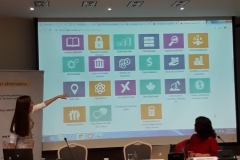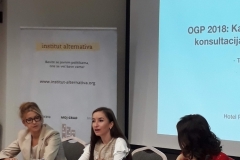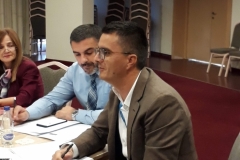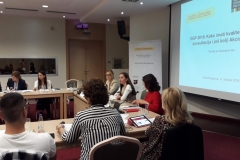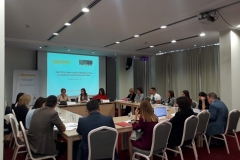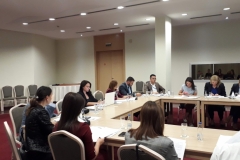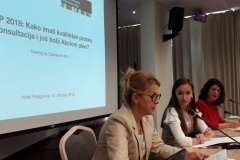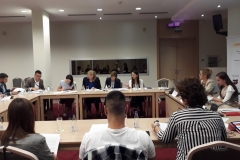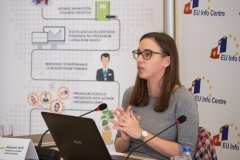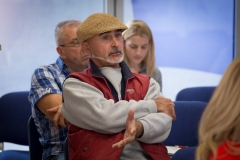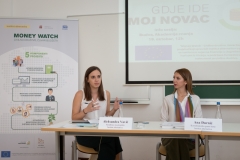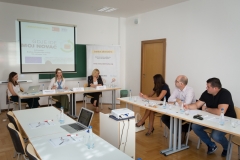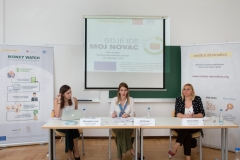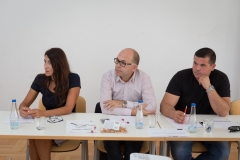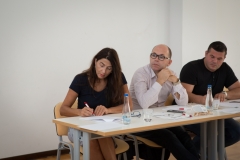Irrational spending? Montenegro is going to spend 18 million euro on medical supplies
For almost three decades, since Health Fund has operated, only once – at the request of the Ministry of health, this institution asked for the list of medical supplies in hospital stocks.
In 2016 the list indicated that there is a lot of unnecessary spending in Montenegrin healthcare. The Minister of health at that time, Budimir Šegrt, in cooperation with the Health Insurance Fund, estimated that they needed approximately eight million euro for medical supplies.
More than five million euros were planned by the budget, but the existing stocks were at the level of three million euro.
“It is estimated that 51.7 percent of the total amount of needed funds remains annually, which implies that the overall health system, along with all health institutions, could function with no additional funds by mid-November 2016”, Šegrt said.
The following year, Šegrt was no longer Minister of health and the budget for medical supplies doubled. It remained at the similar level in 2018, but 2 more million was demanded by the budget rebalance.
“Amount of 15.4 million euro was planned for procurement of medical supplies in 2017, at the level of public healthcare. In the current year, the amount of 16 million euro was initially allocated for the purchase of medical supplies, whereas, because the amount initially allocated did not cover the real needs of the healthcare system, an additional two million euro were allocated through the rebalance of the budget, that is, a total of 18 million euro“, Health Insurance Fund stated in a written response.
The Fund confirmed that they have not been listing medical supplies during the past year, because this is, as they say, competence of health institutions. However, if the supplies are not listed, it is unclear why the budget for them has doubled. Costs of medical supplies have been changing very little over the past several years, as we find out from the procurers. The needs of health insurers have not doubled compared to 2016 either.
“If in two years of functioning of a single system, you have needs that have doubled, it is a situation in which you must absolutely turn on red alert. Someone should have detailed the explanation why suddenly we have a double increase in needs. This is not an increase in needs, it is an attempt to cover the dubiousness that has been obviously created for years”, Boris Marić, former Minister of Labour and Social Welfare, said.
“It is not true that the Health Fund does not control, because it is its role and it is an “umbrella” institution that monitors all these details. It cannot happen that the Clinical Centre runs a particular policy of supplies and on the other hand general hospital in Bar, runs another one”, Mila Kasalica, economic analyst, said.
The largest consumer of medical supplies is Clinical Centre. On average, 60% out of total sum of money goes to this health institution – it is almost 12 million euros in 2018.
“For medical consumable supplies in 2017, 10 736 244,77 euro was allocated from the budget along with 10 769 600 euro for the current year. Also, we note that for the year 2018, a revision of the budget of the Health Insurance Fund has been carried out, whereby a higher amount of 11 845 544 euro has been given to our institution”, the Clinical Centre stated.
In that institution, they say, the list of goods is compiled once a year, while in the case of departments, before the annual proceedings, an informal listing of consumable medical materials is always carried out.
We could not find out whether the results of that list show something else, apart from the usual finding that stocks are optimal for the functioning of the largest healthcare institution in Montenegro.
It is interesting that Clinical Centre is the only healthcare institution that does not have a hospital information system – which implies that the Health Fund does not know how precisely medical material has come into or has left the institution.
“In our place, this is the type of work that is located in tables and papers, that are hand-made, and that is a hell, from counting, pairing, disagreement, which cannot show us a real state of affairs. Why it did not become a regular procedure after 2016 – well, that is a political issue in our country, it is neither a medical nor an economic issue”, Kasalica said.
“Year in, year out – we have been talking about this fund – that some resources have been spent irrationally. What are all the causes of irrational spending – the first cause is the lack of a list of its core property or its essential assets. On the other hand, we do not have an information system that would clearly tell us in-depth about expenditure and the needs of that system”, Marić said.
In the non-governmental sector, they consider that in the whole story there are three fundamental problems: lack of market analysis in the public procurement system, lack of approval of procurement plans by the Ministry of Finance, but also the issue of dual and poor planning.
“We have been coming across that particular procurement, especially in healthcare, have been double-planed, which implies that Fund plans them separately from other health units. This also leaves us to the problem; because it may happen that something is procured twice, or not procured at all. This creates a confusion, how can we know what we have in healthcare system, what do we need more, and what shall we procure”, Ana Đurnić from Institute Alternative said.
At any rate, Montenegro is going to spend 18 million euro on medical supplies in this year.
Director of Health Fund Sead Čirgić recently added that budget allocated to this Fund has not been able to cover real medical needs of the system for years.
He explained that health spending is growing due to the increasing number of consumers of health services, increasing quality and access to health protection and due to the expansion of health insurance rights. He also admitted, however, that it is necessary to maintain control over spending and to rationalize expenditures.
TV report is available here:
This report was created within the project “Money Watch: Civil Society, Guarding the Budget!”, implemented by the Institute Alternative in cooperation with NGO New Horizon and the Institute for Public Finances, with the support of the European Union. The content of this report is the sole responsibility of the author and in no way reflects the views of the European Union.
Ministry of Finance hides EC’s Opinion on the Draft Law on Public-Private Partnership
Ministry of Finance claims that it does not possess the European Commission’s (EC) Opinion on the Draft Law on Public Private Partnership (PPPs), although it states in another document that it obtained the Opinion in July this year.
Acting upon our request for free access to information submitted on 15 September 2018, Ministry of Finance denied us access to the Opinion of the EC on the Draft Law on PPPs, explaining that is does not possess it, since “the harmonisation process is still ongoing”.
 On the other hand, Information on the implementation of the Plan for fulfilling final measures for temporary closing Negotiation Chapter 5 – Public Procurement, adopted by the Government on Thursday, November 1, states that “the Draft Law on PPPs was sent on 16 June 2018 to the European Commission for their opinion”, and that the Ministry of Finance “responded to the European Commission at the end of July 2018, that, in accordance with the Opinion, all suggestions and comments were accepted and incorporated in the new version of the Draft Law”.
On the other hand, Information on the implementation of the Plan for fulfilling final measures for temporary closing Negotiation Chapter 5 – Public Procurement, adopted by the Government on Thursday, November 1, states that “the Draft Law on PPPs was sent on 16 June 2018 to the European Commission for their opinion”, and that the Ministry of Finance “responded to the European Commission at the end of July 2018, that, in accordance with the Opinion, all suggestions and comments were accepted and incorporated in the new version of the Draft Law”.
This means that EC gave an Opinion on this Draft Law, based on which the Ministry prepared a new version of the Draft Law. Thus, the public has the right to know what was problematic in the version of the Law which was sent to the European Commission and what changes has the Commission proposed.
The fact that “the harmonisation process is ongoing”, as stated in the Ministry’s Decision issued upon our FOI request, cannot be adequate rationale for not providing us with the EC’s Opinion. What the Ministry stated in its Decision, that it “does not possess the Opinion” was obviously not true, because now we know that the Ministry received the Opinion at least two months before we requested it.
This is not the first time that the Ministry of Finance and the Government and acting irresponsibly towards the citizens and are hiding the Commission’s opinion on this document.
The latest failed Government’s attempt to regulate public-private partnerships legally ended in May 2015, when a public discussion on the then Draft Law on PPPs was held. The Government has never published a report from this public discussion, the Law has not been adopted nor has the European Commission’s opinion ever been published or made available upon the request for free access to information. The process of preparing this important regulation has been stopped, without any explanation provided by the Government, the topic has been “forgotten”, and only this year the Government began to draft the new PPP Law.
The interested public has the right to be informed on the harmonisation of legislation in this and all the other areas at each stage of the process, not only when everything is already done and the laws are adopted. With such attitude towards the civil society and the general public, the Government renders meaningless the processes of consultations and participation of these actors in the European negotiations process.
Therefore, we call upon the Ministry of Finance to publish the Opinion of the European Commission on the Draft Law on PPPs received in July this year, as well as all the other EC’s opinions on laws and regulations received in the meantime or to be received in the future.
This must be the Government’s standard for including the public in the preparation and adoption of all the future legal acts. This is why in our Proposals for the Open Government Partnership, we have suggested to the Government to proactively publish all the key documents based on which it prepares regulation and its other acts and submits it to the Parliament and thus improve transparency of the policy development.
Based on the comments and opinions of the European Commission, TAIEX and other experts, as well as the Peer Review reports, numerous decisions are made regarding the creation of public policies in Montenegro and their non-transparency prevents interested public from the equal participation in these processes.
Ana Đurnić
Public policy researcher


